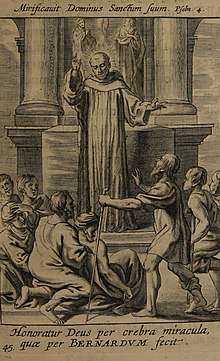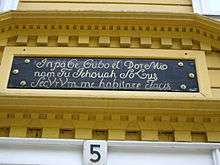Psalm 4
Psalm 4 is the 4th psalm from the Book of Psalms. Its authorship is traditionally assigned to king David, but his authorship is not accepted by modern scholars.[1][2][3][4] The psalm's Latin title is Cum invocarem.[5]
| Psalm 4 | |
|---|---|
 Mirificauit Dominus Sanctum suum. Psalm. 4. Copperplate print by Jacobus Neeffs, 1653. | |
| Text | by David |
| Language | Hebrew (original) |
The psalm's text is a reflection of David speaking to all sinners while addressing himself to Absalom. The message in the psalm is that the victories of sinners are only temporary and meaningless, and that only repentance can bring true happiness.[6] It is a request to God for deliverance from past distresses.[7][8][9]
Context
This is the first psalm with a musical instrument, strings, mentioned in the title.[10][11] There also was a 'selah' ending the previous psalm, Psalm 3.[12] There is, however, no agreement what 'selah' meant. Popular modern views might include a pause, a reflection or a lifting.[13] Poetically, if selah is a connection, it is as if David recited his Psalm 3, then paused and began to sing, continuing with his harp. The themes will be false and true worship, but also false and true satisfaction. 'They long for prosperity', David sings, but David has it and is more satisfied 'than when their grain and new wine abound'.[14]
Many see a chiastic structure in the layout of this psalm.[15]
Uses
Judaism

Book of Common Prayer
In the Church of England's Book of Common Prayer, Psalm 4 is appointed to be read on the morning of the first day of the month.[5]
Catholic
About 530 AD Benedict of Nursia chose this Psalm for the beginning of the office of matins,[20] namely as the first psalm in the Benedictine liturgy (Chapters IX and X).[21] In the monasteries which preserve the Benedictine tradition, it is currently the Psalm used on the first Sunday for office vigiles.[22]
Given the current Liturgy of the Hours, 3 Psalm is sung or recited during the Office of Readings Sunday of the week,[23] the first, after the first two psalms.
Music
Michel Richard Delalande wrote a great motet for this psalm in 1692 for services celebrated in the royal chapel of Versailles, including Louis XIV. Henry Desmarest, a contemporary of Delalande, also wrote a great motet on this psalm.
References
- Berlin, Adele; Brettler, Marc Zvi (2004). "Psalms". In Berlin, Adele; Brettler, Marc Zvi; Fishbane, Michael A. (eds.). The Jewish Study Bible. Oxford University Press. p. 1282. ISBN 9780195297515.CS1 maint: ref=harv (link)
- Kugel, James L. (2017). The Great Shift: Encountering God in Biblical Times. Houghton Mifflin Harcourt. p. 132. ISBN 978-0-544-52057-8. Retrieved 13 June 2020.
- The Destiny of the Righteousin the Psalms. Chalice Press. p. 9. ISBN 978-0-8272-3674-5. Retrieved 13 June 2020.
- Metzger, Bruce M.; Coogan, Michael David (1993). The Oxford Companion to the Bible. Oxford University Press. p. 626. ISBN 978-0-19-974391-9.
- Church of England, Book of Common Prayer: The Psalter as printed by John Baskerville in 1762
- The Artscroll Tehillim page 6
- The Psalms: translated and explained By Joseph Addison Alexander, Ernst Wilhelm Hengstenberg, page 26
- Commentaires sur les psaumes, d’Hilaire de Poitiers, IVe siècle, Paris, Éditions du Cerf, 2008, collection sources chrétiennes n°515.
- Commentaire sur les psaumes (jusqu’au psaume 54), de saint Thomas d’Aquin, 1273, Éditions du Cerf, 1996.
- https://www.journal33.org/other/html/otinstr.html
- https://en.wikiversity.org/wiki/Music_in_the_Bible_(Psalms)
- https://www.kingjamesbibleonline.org/Psalms-Chapter-3/
- Jewish Encyclopaedia, Selah
- Psalms 4:7: NIV translation
- Alden, Robert L., Chiastic Psalms, Journal of the Evangelical Theological Society, accessed 7 May 2020
- The Complete Artscroll Siddur page 295
- The Complete Artscroll Machzor for Rosh Hashanah page 79
- See also Séfer Tehilim, de Rachi, XIe siècle.
- Kirkpatrick, A. F. (1901). The Book of Psalms: with Introduction and Notes. The Cambridge Bible for Schools and Colleges. Book IV and V: Psalms XC-CL. Cambridge: At the University Press. p. 838. Retrieved February 28, 2019.
- According to the Rule of St. Benedict (530 AD), Psalm 1 to Psalm 20 were mainly reserved for premium offices.
- Prosper Guéranger, La règle de Saint Benopit, p.37 & 38
- Psautier latin-français du bréviaire monastique, 1938/2003, p.55.
- The main cycle of liturgical prayers takes place over four weeks.
External links
| Wikimedia Commons has media related to Psalm 4. |